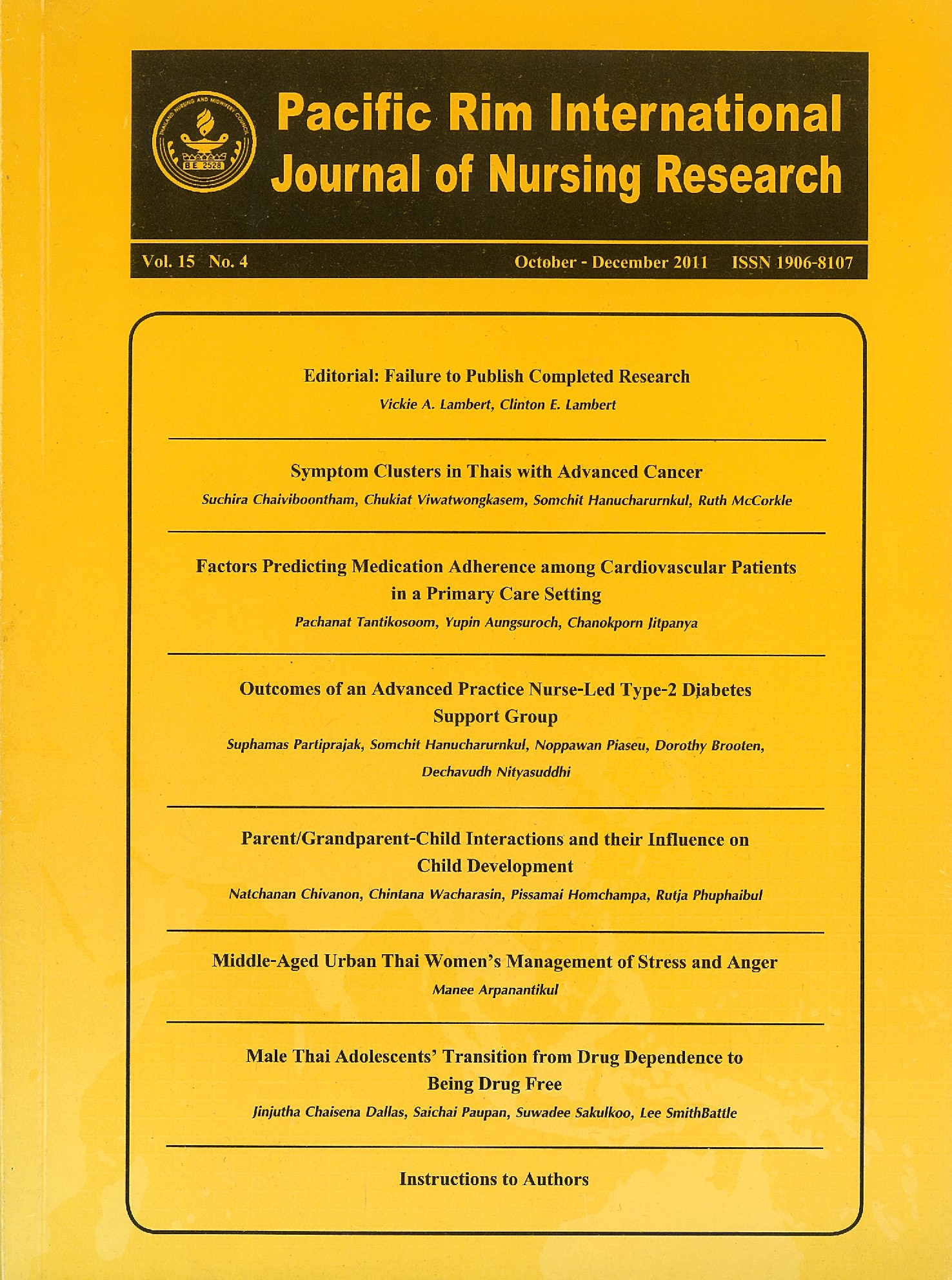Parent/Grandparent-Child Interactions and their Influence on Child Development
Keywords:
การปฏิสัมพันธ์ระหว่างบิดามารดาหรือปู่ย่าตายาย และเด็ก, การศึกษาเชิงชาติพันธ์ุวรรณา, เขตอุตสาหกรรม, พัฒนาการเด็ก, Parent/grandparent-child interactions, Ethnographic study, Industrial setting, Child developmentAbstract
บทคัดย่อ
การศึกษาเชิงคุณภาพ แบบชาติพันธ์ุวรรณนานี้ มีวัตถุประสงค์ เพื่อค้นหาลักษณะของการปฏิสัมพันธ์ระหว่างบิดามารดากับบุตรและผลที่เกิดขึ้น ในครอบครัวที่บิดามารดาทำงานในเขตอุตสาหกรรม ผู้เข้าร่วมวิจัยประกอบด้วย 22 ครอบครัว ที่มีบุตรอายุ 12-36 เดือน ทำงานในเขตอุตสาหกรรม กลุ่มตัวอย่างคัดเลือกจากสถานีอนามัย และโรงงานในเขตอุตสาหกรรม ในอำเภอศรีราชา จังหวัดชลบุรี เก็บรวบรวมข้อมูลโดย การสังเกตแบบมีส่วนร่วม การสัมภาษณ์ เชิงลึก และศึกษาเอกสารที่เกี่ยวข้อง ช่วงเวลาเก็บข้อมูลตั้งแต่ เดือนสิงหาคม 2008 ถึงเดือน กันยายน 2009
วิเคราะห์ข้อมูลเชิงคุณภาพโดยการวิเคราะห์เนื้อหา ผลการศึกษาพบว่าในชีวิตประจำวัน การปฏิสัมพันธ์ระหว่างบิดามารดาและบุตรเกิดขึ้นใน 5 กิจกรรมคือ การให้อาหารลูก การเล่นกับลูก การสอนลูก การฝึกระเบียบวินัยลูก และการดูแลกิจวัตรประจำวันของลูก ส่วนลักษณะของพฤติกรรมของพ่อแม่เมื่อปฏิสัมพันธ์กับลูก เกิดขึ้นใน 4 ลักษณะ คือ การกระตุ้น การสนับสนุน การไม่สนใจหรือเพิกเฉย และการขู่หรือคุกคามลูก ส่วนลักษณะพฤติกรรมของลูก ในระหว่างปฏิสัมพันธ์กับพ่อแม่มี 2 ลักษณะคือ การให้ความร่วมมือ และการไม่ให้ความร่วมมือ นอกจากนี้ ผลการวิจัยยังพบอีกว่า การปฏิสัมพันธ์ระหว่างพ่อแม่กับลูก ส่งผลต่อการเจริญเติบโตด้านร่างกาย ด้านสติปัญญา ด้านภาษา และอารมณ์ และสังคมของเด็ก
ผลการศึกษาครั้งนี้จะช่วยให้พยาบาลและบุคลากรด้านสุขภาพ เข้าใจลักษณะปฏิสัมพันธ์ ระหว่างพ่อแม่ลูก ที่ส่งผลต่อพัฒนาการเด็ก สามารถนำความรู้นี้ไปใช้ในการส่งเสริมการปฏิสัมพันธ์ระหว่างพ่อแม่ลูก โดยเฉพาะในครอบครัวที่มีบุตรในวัยทารกและวัยก่อนวัยเรียน และสามารถพัฒนาโปรแกรมเพื่อเพิ่มคุณภาพการปฏิสัมพันธ์ระหว่างพ่อแม่ลูกที่จะนำไปสู่พัฒนาการเด็กที่ดีขึ้นต่อไป
คำสำคัญ : การปฏิสัมพันธ์ระหว่างบิดามารดาหรือปู่ย่าตายาย และเด็ก, การศึกษาเชิงชาติพันธ์ุวรรณา, เขตอุตสาหกรรม, พัฒนาการเด็ก
Abstract
This ethnographic study sought to explore, among parents working in an industrial setting, parent/grandparent-child interactions and the influence these interactions have on child development. Participants were parents and grandparents from twenty-two families who had children 13 to 36 months of age. The families were recruited from healthcare centers and factories in an industrial area of eastern Thailand. Data were collected via participant observation, in-depth interviews, audio/video tape-recordings, field notes and one secondary source. Analysis of data involved descriptive statistics, and Roper and Shapira’s strategies of ethnographic analysis.
The results revealed parent/grandparent-child interactions occurred within five major activities: feeding, playing, teaching, disciplining and daily-routine caring. The parents’ and grandparents’ behaviors, during interactions with their children, emerged as: encouraging, supporting, ignoring and threatening. The children, simultaneously, responded to their parents or grandparents interactions by using either cooperative or non-cooperative behaviors. The influence of the parent/grandparent-child interactions on child development was found to occur within four categories: physical, cognitive, language, and emotional and social.
The findings suggest the need for nurses and other health professionals to take into account, as they work on improving parent/grandparent-child interactions among families who work in an industrial area, parental/grandparent activities and behaviors related to child development. The results also provide a structure for the creation of interventions, among families with toddlers who reside in an industrial area, which may foster improved parent/grandparent-child interactions and child development.
Keywords : Parent/grandparent-child interactions, Ethnographic study, Industrial setting, Child development
Downloads
How to Cite
Issue
Section
License
Copyright: The Pacific Rim International Journal of Nursing Research, Thailand Nursing & Midwifery Council has exclusive rights to publish, reproduce and distribute the manuscript and all contents therein.








.png)



